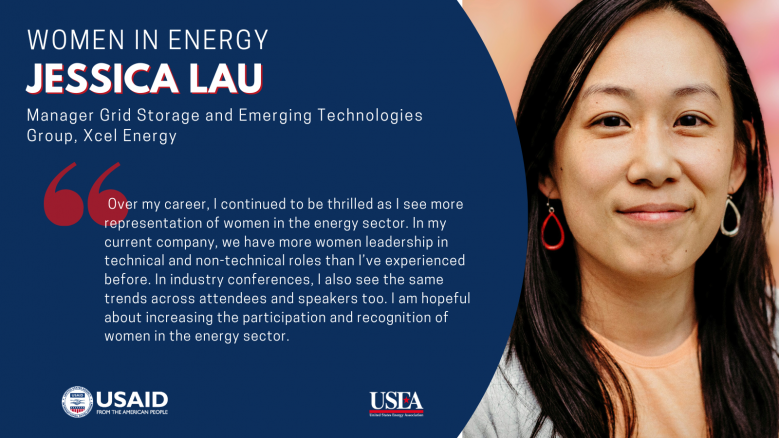
Women in Energy: Jessica Lau
The Women in Energy series is a joint project between USEA and USAID to help improve the visibility of women's participation and leadership in the traditionally male-dominated energy sector and their active participation in policies and gender outcomes in organizations.

Every month we feature a woman who has shown exemplary leadership. The women highlighted come from diverse backgrounds and roles, and they bring with them a unique perspective on gender equality within the energy sector. We believe that increasing women's leadership and participation in decision-making for climate policies needs active communications campaigns and championing that catalyse behavioural change and urgent action.
1. How can the energy sector and organizations within the sector encourage more women to pursue education and careers in STEM fields?
We can start by improving our explanations of how STEM fields make impact in the world. There’s a large focus of STEM on technology and complex methods. But we often neglect the significance of all the inventions and applications are for the sake of making impact in our everyday life and helping people live easier and better.
We can also create opportunities for girls and women to experience STEM and energy topics. This can include volunteering with a local school program, going to career day and sharing your STEM story, or hosting an intern at your company. My favorite thing to share is how each of our most treasured piece of candy encounters a STEM professional in every stage of its life before it arrives in our hands. From the food chemist who decided on the best flavoring, to the materials engineer who made the non-stick wrapper, and finally the civil engineer who designed all the roads the candy travels on to you.
Beyond messaging, the energy sector and organizations need to lead the way to provide competitive wages and leading benefits to attract and retain talent. The energy talent pool is valued across traditional energy companies (i.e., utilities, generating plants, but also transportation, residential and commercial construction, data centers, and many more. This talent competition amongst the industries is positive for women in STEM.
2. Are there any specific educational, professional, or mentor-guided opportunities that have been instrumental in your career growth? Are there specific skills or qualities you believe are particularly important for success in this field?
I have had a few notable mentors in my career that have been my biggest advocate. In times that I doubted myself or if I was ready, they challenged me to look at the facts of my skill and capability. In other times where I blamed others, they challenged me to look for my role and responsibility. For the ones that were more senior in positions, they vouched for me to gain access to learn how senior leadership made decisions and what they valued. If you don’t have a mentor yet, find someone you admire and learn of their story.
To be successful in the energy sector, you need to be adaptable. In STEM education, we’re trained to find the correct answer with all the relevant information provided. But in the real world, we only receive partial information and need to provide solutions in changing conditions. This means we need to be adaptable in learning evolving technology and application, adaptable in observing for changing variables, and adaptable in listening to others.
3. Were there any challenges that you encountered in your career in the energy industry? How did you overcome them?
I love solving problems, which partly explains how I became an engineer. Over time, I have learned to be methodical and prescriptive with providing ideas and solutions over time. In my first internship, I learned that having the right solution doesn’t matter if you don’t have a full understanding of the situation and the right level of buy-in from the team. I learned to listen more and ask many questions. I learned to temper my most immediate reactions and avoid jumping to conclusions. I learned to create solutions with others because a team-made solution is better than an individually made one.
4. Is there a specific project or accomplishment you are particularly proud of that encouraged other women in your team, organization or network at large?
I am most passionate and proud to enable other women and find opportunities for their growth and recognition. I look for every opportunity to do this and to lower barriers. As the Chair of CIGRE Women in Energy in the United States, we have been working to increase women’s participation and recognition. Through time, the relationships and networks that have been developed have been the most rewarding to me. To extend that, we’re launching virtual networking events for Women in Energy in 2024.
To support girls and women who are not yet in STEM, we held our first STEM outreach event for middle school girls last year with overwhelmingly positive feedback. We designed an event that consisted of a short “Tell Your STEM Story” panel from 4 women, then followed with a hands-on building activity. Our success and reach is due to the teamwork and contributions of everyone involved.
5. Do you believe that diversity, equity, and inclusion can fulcrum a clean energy transition? What are some of the untapped actions we can lean on at the community or organizational level?
Yes! The product of the energy industry is to help all people. People that represent their communities, where they live, work, and commute to. They’re most familiar with the energy needs. As subject matter experts, we will only be successful to help determining the most appropriate solutions when we understand each local community’s challenges and needs. A one-size-fits-all solution or presenting solutions that no one needs is not helpful.
We must find ways to communicate about energy that does not demand extensive technical knowledge. I commonly hear from Subject Matter Experts that others “don’t understand the detail” or “can’t grasp how it’s all connected.” We need translators between the “language” of everyday people and high technical energy solutions. Discussing and inventing an energy future together should not require a PhD or 10 years of experience.
6. What strategy or advice will you give young people to advance their career in a male-dominated industry like energy?
My advice is to observe the environment and culture you are in. For example, understanding how decisions are made and what is valued for recognition and promotion. If this does not seem to be observable, meet the people in roles you aspire to and ask them questions. Next, you will need to reflect on the environment and culture you’re and decide if you’re willing to do what they value.
Sometimes, work-life balance is often a subject of discussion for women enabling their work and personal life. This is a long-term work-in-progress for me and this is currently what’s working for me. For my work time, I use a quadrant system to determine tasks that are important vs. not important, and urgent vs. not urgent, sometimes referred to as the Eisenhower Matrix. This also helps me manage other’s expectation for when I will finish a task. For my personal time, I prioritize it equally and non-negotiable as I would for a meeting with my boss. I must admit I still make exceptions to some pressing work matters at times, but I have gotten better at asking questions and determining if something is truly urgent and needs a few hours of turnaround versus something that can be done in the next day. Being a high performer does not mean you have to be available 24 hours a day.
7. In what sectors have you seen an increase in the participation of women and what do you think attributed to it?
Over my career, I continued to be thrilled as I see more representation of women in the energy sector. In my current company, we have more women leadership in technical and non-technical roles than I’ve experienced before. In industry conferences, I also see the same trends across attendees and speakers too. I am hopeful about increasing the participation and recognition of women in the energy sector.
